Pronouns and its types
Download as PPTX, PDF5 likes13,739 views
Pronouns are parts of speech that replace nouns. There are several types of pronouns including personal pronouns, demonstrative pronouns, interrogative pronouns, and possessive pronouns. Personal pronouns refer to specific people or things and include subject pronouns like I, he, she and object pronouns like me, him, her. Demonstrative pronouns point to particular nouns and include this, that, these, those. Interrogative pronouns introduce questions using words like who, what, where. Possessive pronouns show ownership with words like my, your, his, hers.
1 of 18
Downloaded 122 times
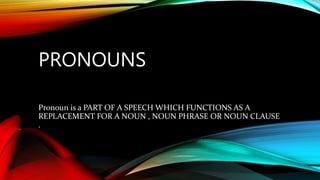
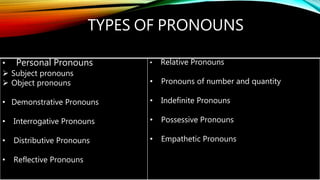
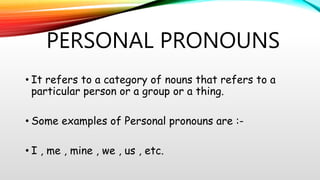
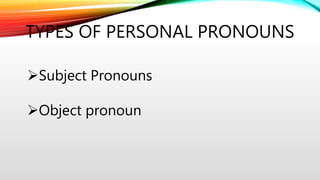
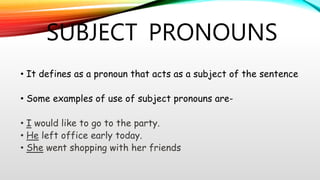
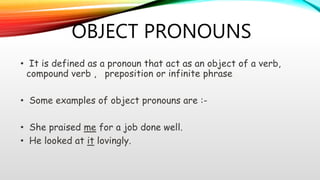
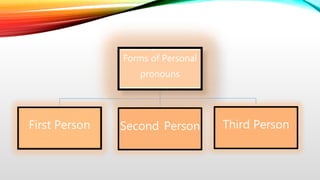
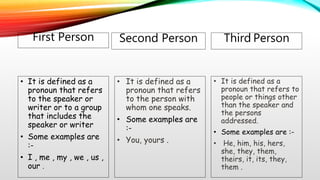

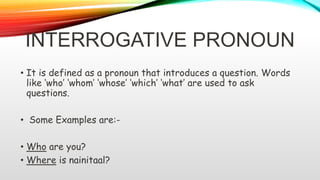
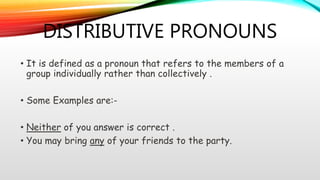
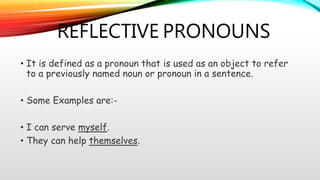
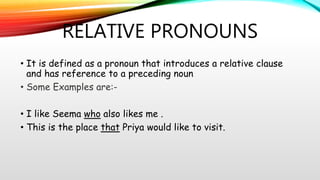
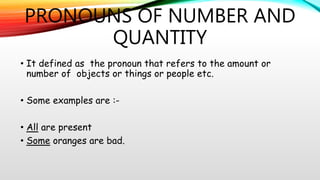
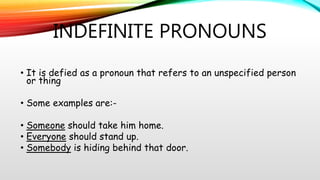
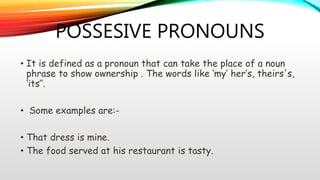
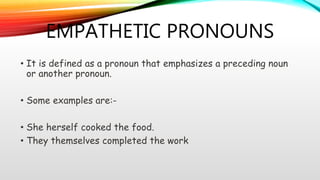

Recommended
Types of pronoun



Types of pronounNeepa Maisheri
Ėý
This document defines and provides examples of 10 types of pronouns: personal, emphatic, reflexive, demonstrative, distributive, relative, exclamatory, possessive, interrogative, and indefinite pronouns. It explains that personal pronouns can be subject or object pronouns and identifies the forms as first, second, and third person. Examples are provided to illustrate the definition and use of each type of pronoun.Verb



VerbAqsa Mushtaq
Ėý
The document presents information about verbs in English. It discusses the different types of verbs such as action verbs, transitive verbs, intransitive verbs, regular verbs, irregular verbs, compound verbs, helping/auxiliary verbs, and linking verbs. It provides examples for each type and explains the differences between helping verbs and linking verbs. It also discusses the different forms a verb can take, including the base form, present tense form, -ing form, past form, and past participle. The document was presented by the Sunshine Group, which includes 11 students.Noun & It's Types



Noun & It's TypesNazeer Hussain University
Ėý
This document discusses the different types of nouns in English. It identifies 9 types of nouns: common nouns, proper nouns, countable nouns, uncountable nouns, compound nouns, collective nouns, abstract nouns, concrete nouns, and predicate nouns. It provides examples for each type and explains their key characteristics, such as proper nouns starting with capital letters and predicate nouns following the verb "to be".Nouns & Kinds of Nouns



Nouns & Kinds of NounsSwati Hasija
Ėý
A fantastic PPT on Nouns. A quick and easy introduction to five kinds of nouns. Understanding of Countable and Uncountable Nouns as well.The use of articles in english



The use of articles in englishEmil JimÃĐnez
Ėý
The document discusses the use of articles (a/an, the) in English. It explains that articles are either definite or indefinite and combine with nouns to indicate the type of reference. The indefinite article (a/an) is used the first time something is mentioned or with plural nouns like jobs. The definite article (the) is used the next time something is mentioned, when the subject is unique, with superlatives, countries with plural names, rivers/seas/oceans/deserts, and to describe locations within a country or city. In some cases, no article is needed with plural or uncountable nouns when making generalizations.Sentence 



Sentence Zara Maryem
Ėý
The document discusses different types of sentences in English grammar. It defines a sentence and identifies the key parts of a sentence as the subject and predicate. It then describes five main types of sentences: declarative, interrogative, imperative, exclamatory, and negative. For each type, it provides examples to illustrate how they are used and structured. The document also briefly discusses optative sentences which are used to express prayers or wishes.Phrase & its kinds



Phrase & its kindsAli Soomro
Ėý
The document discusses different types of phrases in English grammar. There are two main types: noun phrases and adjective phrases. A noun phrase is a group of words that acts as a subject, object, or complement and includes modifiers and determiners. An adjective phrase is a group of words that describes or modifies a noun or pronoun, consisting of an adjective and any additional modifiers. Common examples of phrases are provided such as "a blue shirt" and "the big red apples."Sentence Types: Declarative, Interrogative, Imperative and Exclamatory 



Sentence Types: Declarative, Interrogative, Imperative and Exclamatory Belachew Weldegebriel
Ėý
Sentence Types by Function
Compiled and presented by Belachew W/Gebriel
Jimma University
CSSH
Department of English language and Literature
What is a sentence?
A sentence is a group of words that makes sense.
A sentence expresses a complete thought.
A sentence begins with a capital letter and ends with appropriate terminal punctuation mark.
A sentence has at least one subject and one verb.
There are four types of sentences by function/meaning.
Declarative Sentence â statement
Interrogative Sentence - Question
Imperative Sentence â Command and Request
Exclamatory Sentence
Declarative sentence
A declarative sentence makes a statement.
It is punctuated by a period.
Examples: The concert begins in two hours.
Green is my favorite color.
Addis Ababa is the capital city of Ethiopia.
I love my country.
Dr. Abegaz is the founder of Cardiac Center.
True love never fades with time.
Interrogative Sentence
An interrogative sentence asks a question.
It ends in a question Mark(?)
An indirect question ends with a period(.)
There are four different types of interrogative sentences: Wh-questions, yes or no questions, alternative questions, tag questions
Types of Interrogative Sentences
Wh-Questions
Imperative Sentence
An imperative sentence gives an order or makes a polite request. Imperatives can also express good wish.
It ends with a period or exclamation mark (./!)
Example
Please lower your voice.
Meet me at the town square.
Would you close the door please?
Eat your lunch.
Have a good time at the picnic.
May you live long!
Exclamatory Sentence
An exclamatory sentence expresses strong feelings, great emotion or excitement.
It ends with exclamation mark.
Examples: Wow! That is great news!
The river is rising!
The house is on fire!
Oh, what a great job!
What an interesting story!
Practice Questions
Identify the sentence types.
What Kind of candy do you like?
Wow, you did great!
I love to watch old movies.
Go and bring me some paper.
Practice with key
What Kind of candy do you like?(Interrogative)
Wow, you did great! (Exclamatory)
I love to watch old movies. (Declarative)
Go and bring me some Paper. (Imperative)
Exercise
What a silly man!
You look so beautiful!
Two of my students were absent today.
Our math teacher is tall.
Watch carefully for pirate ships on the horizon.
The trains leaves tomorrow at noon.
Have you brushed your teeth today?
Stop talking so loudly!
Exercise
9. Shut the door please.
10. The train left an hour ago.
11. How old is your daughter?
12. Do not open the presents until the morning!Ėý
Auxiliary verbs



Auxiliary verbsJasmine Pascual
Ėý
An auxiliary verb is used to add functional or grammatical meaning to the main verb. Auxiliary verbs are function words that indicate things like tense, aspect, modality, voice, emphasis, etc. but do not have substantial meaning on their own. Common auxiliary verbs in English include be, do, have, will, can, may, must, shall, should, would, and others. Auxiliary verbs are used to form questions, negatives, passive voice, and different tenses like the present perfect.Subject verb agreement



Subject verb agreementssuser862a42
Ėý
This document discusses subject-verb agreement and provides rules and examples. It begins with definitions of subject and verb. It then provides examples of sentences with subject-verb agreement errors and how to fix them. The rest of the document outlines 11 rules for subject-verb agreement and provides examples for each rule. It concludes with a fun fact about subject-verb agreement and a 10 question true/false quiz about identifying subjects and selecting the correct verb form.Pronouns: Kinds and Cases



Pronouns: Kinds and CasesDraizelle Sexon
Ėý
This document defines and provides examples of different types of pronouns: personal pronouns like I, you, he; relative pronouns like who, that; interrogative pronouns like who, what; indefinite pronouns like anyone, someone; demonstrative pronouns like this, that; reflexive pronouns like myself; intensive pronouns like himself. It also discusses the cases that pronouns can take (nominative, possessive, objective), and rules for pronoun-antecedent agreement regarding number, gender, collective nouns.Clauses



ClausesTeng Sam An
Ėý
This document defines clauses and describes the two main types: independent and dependent clauses. It provides examples of each. Independent clauses can stand alone as a sentence, while dependent clauses cannot. There are three types of dependent clauses: noun clauses, adjective clauses, and adverb clauses. Examples of each type are given. The document also lists related topics and provides links to free online grammar lessons.Transitive and intransitive verbs



Transitive and intransitive verbsRamlaFaisal
Ėý
This document discusses transitive and intransitive verbs. A transitive verb denotes an action that passes from the subject to an object, and can be converted to passive voice. Examples include "She made pizza" and "The boy cut his hand." An intransitive verb denotes an action without an object and cannot be converted to passive voice. Examples include "The sun shines" and "The train stopped." To identify verb types, check if the sentence has an object or can be made passive. This helps determine if the verb is transitive or intransitive.Adjectives



AdjectivesUnited Scholars Organization (LDCU)
Ėý
This document defines and describes different types of adjectives. It explains that adjectives are used to describe, quantify, and identify nouns. The main types of adjectives discussed are: adjectives of quality, which describe a noun's nature; adjectives of quantity, which indicate an amount; adjectives of number, which show numerical values; demonstrative adjectives, which point out nouns; interrogative adjectives, which are used to ask questions; and rules for forming comparative and superlative adjectives. Examples are provided throughout to illustrate each type of adjective.Homophones, Homonyms and Homographs



Homophones, Homonyms and HomographsHanshal Nautiyal
Ėý
Assignment submitted by students of 5EEE of batch 2012-16,Amity University.
Members:
Naval Arya - A2324612021
Divya Chaudhary - A2324612062
Disha Chaudhary - A2324612061
Vasudha Sharma - A2324612046Phrases



PhrasesTaylor Rogers
Ėý
There are 7 types of phrases: noun, verb, adjectival, adverbial, participial, prepositional, and absolute. A phrase is a group of related words that functions as a single part of speech but does not contain both a subject and a verb. Noun phrases include a noun and any modifiers. Verb phrases include a main verb and helping verbs. Prepositional phrases include a preposition, the object of the preposition, and any modifiers. Adjectival phrases modify nouns or pronouns. Participial phrases begin with a participle and modify nouns. Absolute phrases modify entire clauses. Adverbial phrases modify verbs, adjectives, or adverbs.Adjectives - Their Types



Adjectives - Their TypesSri Prakash Vidya Niketan
Ėý
The document discusses the different types of adjectives in English grammar. It defines adjectives as words that add description to nouns and pronouns. There are several kinds of adjectives, including adjectives of quality, quantity, number, distributive adjectives, demonstrative adjectives, possessive adjectives, participial adjectives, interrogative adjectives, and exclamatory adjectives. Each type is defined and examples are provided. The document serves as a guide to the classification of adjectives according to their function.Simple, compound & complex sentences



Simple, compound & complex sentencesCheldy S, Elumba-Pableo
Ėý
basic knowledge in english: rules in simple, compound and complex sentence in preparation for news and feature writing and all other write upsPresentation on Nouns, it's functions and types of Noun.



Presentation on Nouns, it's functions and types of Noun.FahadHasan36
Ėý
Group presentation on the topic Nouns.
It includes all types of examples and images with its function and types.Prepositions- English grammar ppt 



Prepositions- English grammar ppt LikhithaGunturi
Ėý
This document presents an English presentation on parts of speech and types of prepositions. It defines prepositions as words that express the relationship between nouns or pronouns and other parts of a sentence. It then lists and describes 7 types of prepositions: simple prepositions consisting of one word, compound prepositions formed by prefixing a preposition to another part of speech, phrase prepositions that act as single prepositions, and prepositions of time, place, direction, and agent indicating when, where, toward, and by what something occurs. Examples are provided for each type of preposition.Pronoun



Pronounsaumya bhattacharji
Ėý
This document defines and provides examples of different types of pronouns in English. It discusses personal pronouns, possessive pronouns, reflexive pronouns, emphatic pronouns, demonstrative pronouns, indefinite pronouns, interrogative pronouns, and relative pronouns. Examples are provided for each type of pronoun. The document also includes exercises for the reader to practice identifying and using different pronouns.Articles and types of articles- English grammar



Articles and types of articles- English grammarRajashri Bhairamadgi
Ėý
Articles
Three articles
Two types of articles a) indefinite articles and b) definite articles
Learn to use articles when, where and how
definition, examples and rules are given in easy way to understand and remember.Pronouns: Kinds of Pronouns



Pronouns: Kinds of PronounsSwati Hasija
Ėý
This document discusses the different types of pronouns in English. It defines pronouns as words used in place of nouns that avoid repetition. There are 7 main types of pronouns: personal pronouns like I, you; reflexive pronouns like myself; demonstrative pronouns like this, that; indefinite pronouns like some, many; distributive pronouns like each; interrogative pronouns like what, who; and relative pronouns like who, which. Each pronoun type is defined and examples are provided to illustrate their usage and differences between related terms like pronouns and adjectives.Noun-concrete noun and abstract noun



Noun-concrete noun and abstract nounSeenu Singh
Ėý
This document discusses concrete and abstract nouns. It provides examples of each type of noun to illustrate the difference. Concrete nouns name things that can be seen or touched, like "friend" or "camera." Abstract nouns name things that cannot be seen or touched, such as ideas, qualities, or conditions like "friendship", "love", or "ruling." The document contrasts concrete and abstract nouns in a table and provides two additional lists of examples of each type of noun.Pronouns



PronounsNarielyn Elias
Ėý
The document discusses different types of pronouns including personal pronouns like subject and object pronouns, possessive pronouns, indefinite pronouns, reflexive pronouns, and intensive pronouns. It provides examples of how to use each type correctly and activities for the reader to practice identifying and using pronouns.Grammar: 8 parts of speech



Grammar: 8 parts of speechCausing the Song to Sing
Ėý
The document defines and provides examples of the 8 parts of speech in English: nouns, pronouns, verbs, adjectives, adverbs, prepositions, conjunctions, and interjections. It discusses the different types of each part of speech and provides lists of common examples to illustrate each category.TYPES OF NOUNS



TYPES OF NOUNSSelvi Raveendran
Ėý
Nouns can be categorized into several types including proper nouns, common nouns, collective nouns, abstract nouns, and material nouns. Proper nouns name specific persons, places, or things while common nouns name general categories. Collective nouns refer to groups of people or things. Abstract nouns name qualities or concepts rather than physical objects. Material nouns refer to substances things are made of. Examples and exercises are provided to illustrate each type of noun.Conjunction slides



Conjunction slidesAMIR ZESHAN
Ėý
This document discusses different types of conjunctions. It defines conjunctions as words that connect sentences, clauses, or groups of words. The main types discussed are coordinating conjunctions, subordinating conjunctions, correlative conjunctions, and conjunctive adverbs. Coordinating conjunctions give equal importance to the words or sentences they connect, while subordinating conjunctions introduce subordinate clauses and join them to main clauses. Correlative conjunctions connect two balanced clauses or phrases, and conjunctive adverbs connect two sentences together with added meaning. Examples of each type are provided.typesofpronoun-160729141512.pdf



typesofpronoun-160729141512.pdfJonahlieAlegre2
Ėý
This document defines and provides examples of 10 types of pronouns: personal, emphatic, reflexive, demonstrative, distributive, relative, exclamatory, possessive, interrogative, and indefinite pronouns. It explains that personal pronouns can be subject or object pronouns and identifies the forms as first, second, and third person. Examples are provided for each type of pronoun to illustrate their meanings and uses in sentences.typesofpronoun and how to ditrmainit -1 60729141512.pptx



typesofpronoun and how to ditrmainit -1 60729141512.pptxAghsanAbdalghany
Ėý
Pronouns and how to explain More Related Content
What's hot (20)
Auxiliary verbs



Auxiliary verbsJasmine Pascual
Ėý
An auxiliary verb is used to add functional or grammatical meaning to the main verb. Auxiliary verbs are function words that indicate things like tense, aspect, modality, voice, emphasis, etc. but do not have substantial meaning on their own. Common auxiliary verbs in English include be, do, have, will, can, may, must, shall, should, would, and others. Auxiliary verbs are used to form questions, negatives, passive voice, and different tenses like the present perfect.Subject verb agreement



Subject verb agreementssuser862a42
Ėý
This document discusses subject-verb agreement and provides rules and examples. It begins with definitions of subject and verb. It then provides examples of sentences with subject-verb agreement errors and how to fix them. The rest of the document outlines 11 rules for subject-verb agreement and provides examples for each rule. It concludes with a fun fact about subject-verb agreement and a 10 question true/false quiz about identifying subjects and selecting the correct verb form.Pronouns: Kinds and Cases



Pronouns: Kinds and CasesDraizelle Sexon
Ėý
This document defines and provides examples of different types of pronouns: personal pronouns like I, you, he; relative pronouns like who, that; interrogative pronouns like who, what; indefinite pronouns like anyone, someone; demonstrative pronouns like this, that; reflexive pronouns like myself; intensive pronouns like himself. It also discusses the cases that pronouns can take (nominative, possessive, objective), and rules for pronoun-antecedent agreement regarding number, gender, collective nouns.Clauses



ClausesTeng Sam An
Ėý
This document defines clauses and describes the two main types: independent and dependent clauses. It provides examples of each. Independent clauses can stand alone as a sentence, while dependent clauses cannot. There are three types of dependent clauses: noun clauses, adjective clauses, and adverb clauses. Examples of each type are given. The document also lists related topics and provides links to free online grammar lessons.Transitive and intransitive verbs



Transitive and intransitive verbsRamlaFaisal
Ėý
This document discusses transitive and intransitive verbs. A transitive verb denotes an action that passes from the subject to an object, and can be converted to passive voice. Examples include "She made pizza" and "The boy cut his hand." An intransitive verb denotes an action without an object and cannot be converted to passive voice. Examples include "The sun shines" and "The train stopped." To identify verb types, check if the sentence has an object or can be made passive. This helps determine if the verb is transitive or intransitive.Adjectives



AdjectivesUnited Scholars Organization (LDCU)
Ėý
This document defines and describes different types of adjectives. It explains that adjectives are used to describe, quantify, and identify nouns. The main types of adjectives discussed are: adjectives of quality, which describe a noun's nature; adjectives of quantity, which indicate an amount; adjectives of number, which show numerical values; demonstrative adjectives, which point out nouns; interrogative adjectives, which are used to ask questions; and rules for forming comparative and superlative adjectives. Examples are provided throughout to illustrate each type of adjective.Homophones, Homonyms and Homographs



Homophones, Homonyms and HomographsHanshal Nautiyal
Ėý
Assignment submitted by students of 5EEE of batch 2012-16,Amity University.
Members:
Naval Arya - A2324612021
Divya Chaudhary - A2324612062
Disha Chaudhary - A2324612061
Vasudha Sharma - A2324612046Phrases



PhrasesTaylor Rogers
Ėý
There are 7 types of phrases: noun, verb, adjectival, adverbial, participial, prepositional, and absolute. A phrase is a group of related words that functions as a single part of speech but does not contain both a subject and a verb. Noun phrases include a noun and any modifiers. Verb phrases include a main verb and helping verbs. Prepositional phrases include a preposition, the object of the preposition, and any modifiers. Adjectival phrases modify nouns or pronouns. Participial phrases begin with a participle and modify nouns. Absolute phrases modify entire clauses. Adverbial phrases modify verbs, adjectives, or adverbs.Adjectives - Their Types



Adjectives - Their TypesSri Prakash Vidya Niketan
Ėý
The document discusses the different types of adjectives in English grammar. It defines adjectives as words that add description to nouns and pronouns. There are several kinds of adjectives, including adjectives of quality, quantity, number, distributive adjectives, demonstrative adjectives, possessive adjectives, participial adjectives, interrogative adjectives, and exclamatory adjectives. Each type is defined and examples are provided. The document serves as a guide to the classification of adjectives according to their function.Simple, compound & complex sentences



Simple, compound & complex sentencesCheldy S, Elumba-Pableo
Ėý
basic knowledge in english: rules in simple, compound and complex sentence in preparation for news and feature writing and all other write upsPresentation on Nouns, it's functions and types of Noun.



Presentation on Nouns, it's functions and types of Noun.FahadHasan36
Ėý
Group presentation on the topic Nouns.
It includes all types of examples and images with its function and types.Prepositions- English grammar ppt 



Prepositions- English grammar ppt LikhithaGunturi
Ėý
This document presents an English presentation on parts of speech and types of prepositions. It defines prepositions as words that express the relationship between nouns or pronouns and other parts of a sentence. It then lists and describes 7 types of prepositions: simple prepositions consisting of one word, compound prepositions formed by prefixing a preposition to another part of speech, phrase prepositions that act as single prepositions, and prepositions of time, place, direction, and agent indicating when, where, toward, and by what something occurs. Examples are provided for each type of preposition.Pronoun



Pronounsaumya bhattacharji
Ėý
This document defines and provides examples of different types of pronouns in English. It discusses personal pronouns, possessive pronouns, reflexive pronouns, emphatic pronouns, demonstrative pronouns, indefinite pronouns, interrogative pronouns, and relative pronouns. Examples are provided for each type of pronoun. The document also includes exercises for the reader to practice identifying and using different pronouns.Articles and types of articles- English grammar



Articles and types of articles- English grammarRajashri Bhairamadgi
Ėý
Articles
Three articles
Two types of articles a) indefinite articles and b) definite articles
Learn to use articles when, where and how
definition, examples and rules are given in easy way to understand and remember.Pronouns: Kinds of Pronouns



Pronouns: Kinds of PronounsSwati Hasija
Ėý
This document discusses the different types of pronouns in English. It defines pronouns as words used in place of nouns that avoid repetition. There are 7 main types of pronouns: personal pronouns like I, you; reflexive pronouns like myself; demonstrative pronouns like this, that; indefinite pronouns like some, many; distributive pronouns like each; interrogative pronouns like what, who; and relative pronouns like who, which. Each pronoun type is defined and examples are provided to illustrate their usage and differences between related terms like pronouns and adjectives.Noun-concrete noun and abstract noun



Noun-concrete noun and abstract nounSeenu Singh
Ėý
This document discusses concrete and abstract nouns. It provides examples of each type of noun to illustrate the difference. Concrete nouns name things that can be seen or touched, like "friend" or "camera." Abstract nouns name things that cannot be seen or touched, such as ideas, qualities, or conditions like "friendship", "love", or "ruling." The document contrasts concrete and abstract nouns in a table and provides two additional lists of examples of each type of noun.Pronouns



PronounsNarielyn Elias
Ėý
The document discusses different types of pronouns including personal pronouns like subject and object pronouns, possessive pronouns, indefinite pronouns, reflexive pronouns, and intensive pronouns. It provides examples of how to use each type correctly and activities for the reader to practice identifying and using pronouns.Grammar: 8 parts of speech



Grammar: 8 parts of speechCausing the Song to Sing
Ėý
The document defines and provides examples of the 8 parts of speech in English: nouns, pronouns, verbs, adjectives, adverbs, prepositions, conjunctions, and interjections. It discusses the different types of each part of speech and provides lists of common examples to illustrate each category.TYPES OF NOUNS



TYPES OF NOUNSSelvi Raveendran
Ėý
Nouns can be categorized into several types including proper nouns, common nouns, collective nouns, abstract nouns, and material nouns. Proper nouns name specific persons, places, or things while common nouns name general categories. Collective nouns refer to groups of people or things. Abstract nouns name qualities or concepts rather than physical objects. Material nouns refer to substances things are made of. Examples and exercises are provided to illustrate each type of noun.Conjunction slides



Conjunction slidesAMIR ZESHAN
Ėý
This document discusses different types of conjunctions. It defines conjunctions as words that connect sentences, clauses, or groups of words. The main types discussed are coordinating conjunctions, subordinating conjunctions, correlative conjunctions, and conjunctive adverbs. Coordinating conjunctions give equal importance to the words or sentences they connect, while subordinating conjunctions introduce subordinate clauses and join them to main clauses. Correlative conjunctions connect two balanced clauses or phrases, and conjunctive adverbs connect two sentences together with added meaning. Examples of each type are provided.Similar to Pronouns and its types (20)
typesofpronoun-160729141512.pdf



typesofpronoun-160729141512.pdfJonahlieAlegre2
Ėý
This document defines and provides examples of 10 types of pronouns: personal, emphatic, reflexive, demonstrative, distributive, relative, exclamatory, possessive, interrogative, and indefinite pronouns. It explains that personal pronouns can be subject or object pronouns and identifies the forms as first, second, and third person. Examples are provided for each type of pronoun to illustrate their meanings and uses in sentences.typesofpronoun and how to ditrmainit -1 60729141512.pptx



typesofpronoun and how to ditrmainit -1 60729141512.pptxAghsanAbdalghany
Ėý
Pronouns and how to explain ada ppt (2).pptx



ada ppt (2).pptxPhoemelaDaneLeydan
Ėý
A pronoun is a word that refers to a noun to avoid repetition. The main types of pronouns are possessive, demonstrative, interrogative, reciprocal, relative, intensive, reflexive, personal, and indefinite pronouns. Examples are provided for each type, such as "my" and "your" for possessive pronouns, "this" and "that" for demonstrative pronouns, and "who", "whom", and "what" for interrogative pronouns.Pronouns



Pronounsjfistudent
Ėý
This document defines and describes different types of pronouns:
- Personal pronouns refer to specific people or things and include subject and object cases.
- Possessive pronouns indicate possession.
- Reflexive pronouns reflect back to a noun, add new information, and cannot be removed from sentences.
- Intensive pronouns add emphasis and can be removed from sentences.
- Demonstrative pronouns point out specific nouns and include this/that for singular and these/those for plural.
- Interrogative pronouns form questions.
- Relative pronouns begin subordinate clauses.
- Indefinite pronouns refer to unspecified persons or thingsPronoun presentation



Pronoun presentationReshDigitalMarketer
Ėý
This document defines and provides examples of different types of pronouns in English. It discusses personal pronouns, interrogative pronouns, indefinite pronouns, relative pronouns, possessive pronouns, reflexive pronouns, intensive pronouns, demonstrative pronouns, reciprocal pronouns, and distributive pronouns. For each type of pronoun, it identifies what category they fall into and provides examples to illustrate proper usage. The document is intended to serve as a comprehensive reference for understanding English pronouns.Pronouns (Precious).pdf



Pronouns (Precious).pdfpqzurlsyssa
Ėý
This document defines and provides examples of different types of pronouns in English, including:
1) Possessive pronouns like mine, ours, yours, his, hers, theirs, and whose which indicate ownership.
2) Personal pronouns like I, you, he, she, it, we, they, me, him, her, us, and them which are used as substitutes for names.
3) Relative pronouns like who, whom, whose, which, and that which are used to refer to people or things mentioned earlier in a sentence.
4) Demonstrative pronouns like this, that, these, and those which point to something specificpersonal .Pronouns for. esl students.ppt



personal .Pronouns for. esl students.pptcesar301189
Ėý
This document summarizes different types of pronouns in Spanish, including personal pronouns, demonstrative pronouns, interrogative pronouns, indefinite pronouns, relative pronouns, reflexive pronouns, and possessive pronouns. It provides examples of how each pronoun is used and conjugated based on person, number, gender, and case. Key details include the forms of personal pronouns like "I, you, he, she, it" and how demonstrative pronouns like "this, that" change based on distance.adjective (1).pptx



adjective (1).pptxMuneeburRehman627531
Ėý
This document defines and provides examples of the 8 types of adjectives in English: quality, quantity, number, demonstrative, interrogative, distributive, proper, and possessive. It explains each type of adjective, provides examples, and in some cases notes the difference between similar adjective and pronoun forms.Grammar



Grammarrichamandla15
Ėý
The document discusses various parts of English grammar including nouns, pronouns, adjectives, verbs, and tenses. It provides definitions and examples of different types of nouns such as common nouns, proper nouns, collective nouns, and plural nouns. It also discusses pronouns, adjectives, verbs and verb tenses including present, past and future tenses.partsofspeech-140707153049-phpapp02.pptx



partsofspeech-140707153049-phpapp02.pptxAyeshaIftikharbc
Ėý
The document provides an overview of the different parts of speech in English language. It discusses the eight main parts of speech - nouns, pronouns, verbs, adjectives, adverbs, conjunctions, prepositions, and interjections. For each part of speech, it describes their definition and classification with examples. It particularly focuses on nouns and their types including proper/common, countable/uncountable, abstract/concrete nouns. It also explains the different types of pronouns, adjectives, adverbs, verbs and other parts of speech.GRAMMAR-TOPIC-1.pptx



GRAMMAR-TOPIC-1.pptxEsnardinKanavan1
Ėý
The document provides an overview of the different parts of speech in English grammar: nouns, pronouns, verbs, adjectives, adverbs, prepositions, conjunctions, and interjections. It defines each part of speech and provides examples. It discusses the different types of nouns, pronouns, verbs, adjectives, adverbs, prepositions, and conjunctions. It also covers topics like singular and plural nouns, compound nouns, common and proper nouns, possessive nouns, and more. Practice questions are included throughout for readers to test their understanding of the parts of speech.Pronoun_Xanderlyn Gozon.pptx



Pronoun_Xanderlyn Gozon.pptxXanderlynGozon
Ėý
This document defines and provides examples of 8 types of pronouns: personal pronouns like he and she; interrogative pronouns used in questions like what and which; indefinite pronouns referring to unspecified things like anyone; reflexive pronouns ending in self like myself; demonstrative pronouns indicating something like this; relative pronouns supplying more information like whoever; reciprocal pronouns indicating mutual relationships like each other; and possessive pronouns showing possession like mine.Parts of Speech



Parts of SpeechWajiha Muhammad Ismail
Ėý
The document defines and provides examples of the eight parts of speech in English: noun, pronoun, adjective, verb, adverb, conjunction, preposition, and interjection. It discusses each part of speech in more detail, defining their purpose and providing types and examples. For nouns, it defines common, proper, concrete, abstract, and collective nouns. For pronouns, it defines personal pronouns and their categories. For adjectives, it discusses degrees of adjectives. For verbs, it notes they show action and have tenses. It then defines adverbs and their kinds. Finally, it briefly defines conjunctions, prepositions, and interjections and provides examples of each.Parts of speech in English



Parts of speech in Englishrushda002
Ėý
The document discusses the different parts of speech in English language. It explains that there are eight main parts of speech: nouns, pronouns, verbs, adjectives, adverbs, conjunctions, prepositions, and interjections. For each part of speech, it provides examples and classifications. It discusses the different types of nouns like proper vs. common nouns. It also explains the different types of pronouns, verbs, adjectives, adverbs, conjunctions and other parts of speech.Parts of speech and their examples and types



Parts of speech and their examples and typeslaibakha987
Ėý
what is parts of speech and their types with all examplesPronouns



Pronounsvaishnaviagarwal16
Ėý
Pronouns are used in place of nouns to avoid repetition. There are different types of pronouns including personal, possessive, demonstrative, relative, reflexive, and interrogative pronouns. Personal pronouns represent specific people or things and can be singular or plural, first, second, or third person. Possessive pronouns show ownership, and demonstrative pronouns indicate position as near or far. Relative pronouns introduce relative clauses and interrogative pronouns are used to ask questions.Parts of speech



Parts of speechwaleed732
Ėý
1. This document defines and describes the different parts of speech in English language including nouns, pronouns, adjectives, verbs, adverbs, conjunctions, prepositions, interjections, and articles.
2. It provides examples and classifications for each part of speech. For nouns, it describes common and proper nouns, singular and plural nouns, abstract and concrete nouns.
3. For verbs it discusses transitive and intransitive verbs. For adjectives it covers quality, quantity, numeral, demonstrative, and interrogative adjectives. The document aims to comprehensively explain the parts of speech that make up the English language.Speaking In English: A Discussion on the Parts of Speech



Speaking In English: A Discussion on the Parts of SpeechRobert Joshua Busalla
Ėý
The document discusses the parts of speech in English. It defines eight parts of speech: noun, pronoun, verb, adjective, adverb, preposition, interjection, and conjunction. For each part of speech, it provides definitions and examples. It discusses different types of nouns, pronouns, verbs and verb tenses. The document aims to explain the basic building blocks of language and how they are used in sentences.Recently uploaded (20)
How to use Init Hooks in Odoo 18 - Odoo šÝšÝßĢs



How to use Init Hooks in Odoo 18 - Odoo šÝšÝßĢsCeline George
Ėý
In this slide, weâll discuss on how to use Init Hooks in Odoo 18. In Odoo, Init Hooks are essential functions specified as strings in the __init__ file of a module.APM People Interest Network Conference - Tim Lyons - The neurological levels ...



APM People Interest Network Conference - Tim Lyons - The neurological levels ...Association for Project Management
Ėý
APM People Interest Network Conference 2025
-Autonomy, Teams and Tension: Projects under stress
-Tim Lyons
-The neurological levels of
team-working: Harmony and tensions
With a background in projects spanning more than 40 years, Tim Lyons specialised in the delivery of large, complex, multi-disciplinary programmes for clients including Crossrail, Network Rail, ExxonMobil, Siemens and in patent development. His first career was in broadcasting, where he designed and built commercial radio station studios in Manchester, Cardiff and Bristol, also working as a presenter and programme producer. Tim now writes and presents extensively on matters relating to the human and neurological aspects of projects, including communication, ethics and coaching. He holds a Masterâs degree in NLP, is an NLP Master Practitioner and International Coach. He is the Deputy Lead for APMâs People Interest Network.
Session | The Neurological Levels of Team-working: Harmony and Tensions
Understanding how teams really work at conscious and unconscious levels is critical to a harmonious workplace. This session uncovers what those levels are, how to use them to detect and avoid tensions and how to smooth the management of change by checking you have considered all of them.Information Technology for class X CBSE skill Subject



Information Technology for class X CBSE skill SubjectVEENAKSHI PATHAK
Ėý
These questions are based on cbse booklet for 10th class information technology subject code 402. these questions are sufficient for exam for first lesion. This subject give benefit to students and good marks. if any student weak in one main subject it can replace with these marks.Rass MELAI : an Internet MELA Quiz Finals - El Dorado 2025



Rass MELAI : an Internet MELA Quiz Finals - El Dorado 2025Conquiztadors- the Quiz Society of Sri Venkateswara College
Ėý
Finals of Rass MELAI : a Music, Entertainment, Literature, Arts and Internet Culture Quiz organized by Conquiztadors, the Quiz society of Sri Venkateswara College under their annual quizzing fest El Dorado 2025. N.C. DPI's 2023 Language Diversity Briefing



N.C. DPI's 2023 Language Diversity BriefingMebane Rash
Ėý
The number of languages spoken in NC public schools.Principle and Practices of Animal Breeding || Boby Basnet



Principle and Practices of Animal Breeding || Boby BasnetBoby Basnet
Ėý
Principle and Practices of Animal Breeding Full Note
|| Assistant Professor Boby Basnet ||IAAS || AFU || PU || FUDigital Tools with AI for e-Content Development.pptx



Digital Tools with AI for e-Content Development.pptxDr. Sarita Anand
Ėý
This ppt is useful for not only for B.Ed., M.Ed., M.A. (Education) or any other PG level students or Ph.D. scholars but also for the school, college and university teachers who are interested to prepare an e-content with AI for their students and others.Adventure Activities Final By H R Gohil Sir



Adventure Activities Final By H R Gohil SirGUJARATCOMMERCECOLLE
Ėý
Adventure Activities Final By H R Gohil SirDatabase population in Odoo 18 - Odoo slides



Database population in Odoo 18 - Odoo slidesCeline George
Ėý
In this slide, weâll discuss the database population in Odoo 18. In Odoo, performance analysis of the source code is more important. Database population is one of the methods used to analyze the performance of our code. Rass MELAI : an Internet MELA Quiz Prelims - El Dorado 2025



Rass MELAI : an Internet MELA Quiz Prelims - El Dorado 2025Conquiztadors- the Quiz Society of Sri Venkateswara College
Ėý
Prelims of Rass MELAI : a Music, Entertainment, Literature, Arts and Internet Culture Quiz organized by Conquiztadors, the Quiz society of Sri Venkateswara College under their annual quizzing fest El Dorado 2025. How to Modify Existing Web Pages in Odoo 18



How to Modify Existing Web Pages in Odoo 18Celine George
Ėý
In this slide, weâll discuss on how to modify existing web pages in Odoo 18. Web pages in Odoo 18 can also gather user data through user-friendly forms, encourage interaction through engaging features. Research & Research Methods: Basic Concepts and Types.pptx



Research & Research Methods: Basic Concepts and Types.pptxDr. Sarita Anand
Ėý
This ppt has been made for the students pursuing PG in social science and humanities like M.Ed., M.A. (Education), Ph.D. Scholars. It will be also beneficial for the teachers and other faculty members interested in research and teaching research concepts.QuickBooks Desktop to QuickBooks Online How to Make the Move



QuickBooks Desktop to QuickBooks Online How to Make the MoveTechSoup
Ėý
If you use QuickBooks Desktop and are stressing about moving to QuickBooks Online, in this webinar, get your questions answered and learn tips and tricks to make the process easier for you.
Key Questions:
* When is the best time to make the shift to QuickBooks Online?
* Will my current version of QuickBooks Desktop stop working?
* I have a really old version of QuickBooks. What should I do?
* I run my payroll in QuickBooks Desktop now. How is that affected?
*Does it bring over all my historical data? Are there things that don't come over?
* What are the main differences between QuickBooks Desktop and QuickBooks Online?
* And moreHow to attach file using upload button Odoo 18



How to attach file using upload button Odoo 18Celine George
Ėý
In this slide, weâll discuss on how to attach file using upload button Odoo 18. Odoo features a dedicated model, 'ir.attachments,' designed for storing attachments submitted by end users. We can see the process of utilizing the 'ir.attachments' model to enable file uploads through web forms in this slide.Lesson Plan M1 2024 Lesson Plan M1 2024 Lesson Plan M1 2024 Lesson Plan M1...



Lesson Plan M1 2024 Lesson Plan M1 2024 Lesson Plan M1 2024 Lesson Plan M1...pinkdvil200
Ėý
Lesson Plan M1 2024 Lesson Plan M1 2024 Lesson Plan M1 2024 APM People Interest Network Conference - Tim Lyons - The neurological levels ...



APM People Interest Network Conference - Tim Lyons - The neurological levels ...Association for Project Management
Ėý
Rass MELAI : an Internet MELA Quiz Finals - El Dorado 2025



Rass MELAI : an Internet MELA Quiz Finals - El Dorado 2025Conquiztadors- the Quiz Society of Sri Venkateswara College
Ėý
Rass MELAI : an Internet MELA Quiz Prelims - El Dorado 2025



Rass MELAI : an Internet MELA Quiz Prelims - El Dorado 2025Conquiztadors- the Quiz Society of Sri Venkateswara College
Ėý
Pronouns and its types
- 1. PRONOUNS Pronoun is a PART OF A SPEECH WHICH FUNCTIONS AS A REPLACEMENT FOR A NOUN , NOUN PHRASE OR NOUN CLAUSE .
- 2. TYPES OF PRONOUNS âĒ Personal Pronouns ï Subject pronouns ï Object pronouns âĒ Demonstrative Pronouns âĒ Interrogative Pronouns âĒ Distributive Pronouns âĒ Reflective Pronouns âĒ Relative Pronouns âĒ Pronouns of number and quantity âĒ Indefinite Pronouns âĒ Possessive Pronouns âĒ Empathetic Pronouns
- 3. PERSONAL PRONOUNS âĒ It refers to a category of nouns that refers to a particular person or a group or a thing. âĒ Some examples of Personal pronouns are :- âĒ I , me , mine , we , us , etc.
- 4. TYPES OF PERSONAL PRONOUNS ïSubject Pronouns ïObject pronoun
- 5. SUBJECT PRONOUNS âĒ It defines as a pronoun that acts as a subject of the sentence âĒ Some examples of use of subject pronouns are- âĒ I would like to go to the party. âĒ He left office early today. âĒ She went shopping with her friends
- 6. OBJECT PRONOUNS âĒ It is defined as a pronoun that act as an object of a verb, compound verb , preposition or infinite phrase âĒ Some examples of object pronouns are :- âĒ She praised me for a job done well. âĒ He looked at it lovingly.
- 7. Forms of Personal pronouns First Person Second Person Third Person
- 8. First Person âĒ It is defined as a pronoun that refers to the speaker or writer or to a group that includes the speaker or writer âĒ Some examples are :- âĒ I , me , my , we , us , our . Second Person âĒ It is defined as a pronoun that refers to the person with whom one speaks. âĒ Some examples are :- âĒ You, yours . Third Person âĒ It is defined as a pronoun that refers to people or things other than the speaker and the persons addressed. âĒ Some examples are :- âĒ He, him, his, hers, she, they, them, theirs, it, its, they, them .
- 9. DEMONSTRATIVE PRONOUNS âĒ It is defined as a pronoun that points to a particular noun or to the noun it replaces. âĒ Some examples of Demonstrative Pronouns are:- âĒ She gifted me that pen. âĒ These are my pets.
- 10. INTERROGATIVE PRONOUN âĒ It is defined as a pronoun that introduces a question. Words like âwhoâ âwhomâ âwhoseâ âwhichâ âwhatâ are used to ask questions. âĒ Some Examples are:- âĒ Who are you? âĒ Where is nainitaal?
- 11. DISTRIBUTIVE PRONOUNS âĒ It is defined as a pronoun that refers to the members of a group individually rather than collectively . âĒ Some Examples are:- âĒ Neither of you answer is correct . âĒ You may bring any of your friends to the party.
- 12. REFLECTIVE PRONOUNS âĒ It is defined as a pronoun that is used as an object to refer to a previously named noun or pronoun in a sentence. âĒ Some Examples are:- âĒ I can serve myself. âĒ They can help themselves.
- 13. RELATIVE PRONOUNS âĒ It is defined as a pronoun that introduces a relative clause and has reference to a preceding noun âĒ Some Examples are:- âĒ I like Seema who also likes me . âĒ This is the place that Priya would like to visit.
- 14. PRONOUNS OF NUMBER AND QUANTITY âĒ It defined as the pronoun that refers to the amount or number of objects or things or people etc. âĒ Some examples are :- âĒ All are present âĒ Some oranges are bad.
- 15. INDEFINITE PRONOUNS âĒ It is defied as a pronoun that refers to an unspecified person or thing âĒ Some examples are:- âĒ Someone should take him home. âĒ Everyone should stand up. âĒ Somebody is hiding behind that door.
- 16. POSSESIVE PRONOUNS âĒ It is defined as a pronoun that can take the place of a noun phrase to show ownership . The words like âmyâ herâs, theirs's, âitsââ. âĒ Some examples are:- âĒ That dress is mine. âĒ The food served at his restaurant is tasty.
- 17. EMPATHETIC PRONOUNS âĒ It is defined as a pronoun that emphasizes a preceding noun or another pronoun. âĒ Some examples are:- âĒ She herself cooked the food. âĒ They themselves completed the work
- 18. THANK YOU






